时间地点介词的用法
(完整版)介词用法总结
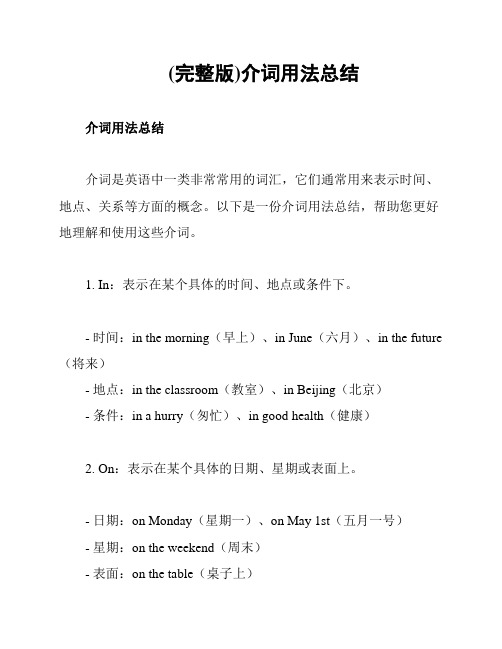
(完整版)介词用法总结介词用法总结介词是英语中一类非常常用的词汇,它们通常用来表示时间、地点、关系等方面的概念。
以下是一份介词用法总结,帮助您更好地理解和使用这些介词。
1. In:表示在某个具体的时间、地点或条件下。
- 时间:in the morning(早上)、in June(六月)、in the future (将来)- 地点:in the classroom(教室)、in Beijing(北京)- 条件:in a hurry(匆忙)、in good health(健康)2. On:表示在某个具体的日期、星期或表面上。
- 日期:on Monday(星期一)、on May 1st(五月一号)- 星期:on the weekend(周末)- 表面:on the table(桌子上)3. At:表示在某个具体的时间、地点或时刻。
- 时间:at 3 o'clock(三点钟)、at night(晚上)- 地点:at the park(公园)- 时刻:at the moment(此刻)4. By:表示通过某种方式或由某人完成某事。
- 方式:go to work by car(坐车上班)- 人:the book written by Mark Twain(马克·吐温所写的书)5. With:表示陪同、具备、使用等概念。
- 陪同:go shopping with friends(和朋友一起去购物)- 具备:a house with a garden(带有花园的房子)- 使用:write with a pen(用钢笔写)6. For:表示为了某个目的、期间或持续时间。
- 目的:study for the test(为考试研究)- 期间:wait for a while(等一会儿)- 持续时间:sleep for eight hours(睡八个小时)以上是介词的基本用法总结,希望对您有所帮助!。
介词短语的时间和地点用法

介词短语的时间和地点用法介词短语在英语中是非常常见的语法结构,用于表示时间和地点。
它由一个介词和它所需的名词短语组成。
了解介词短语的时间和地点用法对于正确理解和运用英语语法至关重要。
下面将介绍介词短语的时间和地点用法。
一、介词短语的时间用法介词短语在时间表达中常用来表示具体的时间,例如:in 1998(在1998年), on Monday(在星期一), at 3 o'clock(在3点钟)。
在这些表达中,介词短语在句子中充当状语,用于说明动作发生的时间。
1. 使用“in”表示一段时间内介词“in”用于表示一段时间内,例如:in the morning(在早上), in a week(一周后), in December(在十二月)。
它常用于表示一段连续的时间,如一天、一周、一年等。
2. 使用“on”表示具体的某一天或日期介词“on”用于表示具体的某一天或日期,例如:on Friday(在星期五), on October 1st(在10月1日)。
它常用于表示具体的某一天、日期或节日。
3. 使用“at”表示具体的时间点介词“at”用于表示具体的时间点,例如:at 7 o'clock(在7点钟), at midnight(在午夜)。
它常用于表示特定的时刻或具体的时间点。
二、介词短语的地点用法介词短语在地点表达中常用来表示具体的地点,例如:in the park (在公园内), on the table(在桌子上), at school(在学校)。
1. 使用“in”表示某个范围内的地点介词“in”用于表示某个范围内的地点,例如:in the city(在城市里), in the room(在房间里)。
它常用于表示具体的范围或区域内。
2. 使用“on”表示某个平面上的地点介词“on”用于表示某个平面上的地点,例如:on the street(在街上), on the wall(在墙上)。
它常用于表示某个平面或表面上的具体位置。
介词的用法总结归纳

介词的用法总结归纳介词是指用来连接名词、代词或者动词与其他词语的词类。
以下是介词的用法总结归纳:1. 表示时间:at, in, on, during, for- at:表示具体的时间点(如at 7 o'clock)- in:表示较长的一段时间(如in the morning)- on:表示具体的日期或者星期几(如on Monday)- during:表示在其中一段时间内(如during the summer)- for:表示持续的时间(如for two hours)2. 表示地点:at, in, on- at:表示具体的地点,可以是建筑物、街道等(如at the park)- in:表示在一些区域、国家、城市等范围内(如in China)- on:表示在具体的道路、街道上(如on Main Street)3. 表示方式、方式、原因等:by, through, with, for- by:表示通过其中一种方式或者交通工具(如by bus)- through:表示通过一些地方或者途径(如through the forest)- with:表示使用其中一种工具或者伴随(如with a pen)- for:表示出于其中一种目的或原因(如for fun)4. 表示关系、位置:to, from, of, at, with, between, among- to:表示动作的目标、方向或者接触的人(如go to school)- of:表示所属关系或者材料(如a book of poetry)- at:表示一些地方或者特定位置(如look at the sky)- with:表示陪伴或者所带有的特征(如play with friends)- between:表示两者之间的关系(如between two buildings)- among:表示在多个元素中的关系(如among the flowers)5. 表示目的、目标:for, to, in order to- for:表示为了一些目的或者利益(如study for an exam)- to:表示动作的目标、方向或者接触的人(如go to a party)- in order to:表示为了达到一些目标或结果(如practice in order to improve)6. 表示比较、对比:than, as, like- than:表示比较两个事物的差异(如bigger than mine)- as:表示类似、与...一样(如the same as you)- like:表示类似、像...一样(如look like a cat)7. 其他常用介词:with, without, by, through, because of, on behalf of, in spite of, about, around- with:表示伴随、具备(如play with friends)- without:表示没有、无(如without any money)- by:表示通过、依靠(如by email)- through:表示穿过、通过(如walk through the door)- because of:表示因为(如cancel the trip because of the weather)- on behalf of:代表、代表着(如speak on behalf of the team)- in spite of:尽管(如in spite of the rain)- about:关于、大约(如talk about a movie)- around:在周围、大约(如walk around the lake)需要注意的是,介词的用法在不同的语境中可能存在细微的差异,因此需要根据具体的句子和语境来确定正确的介词使用。
初中英语知识点归纳介词的表示时间与地点
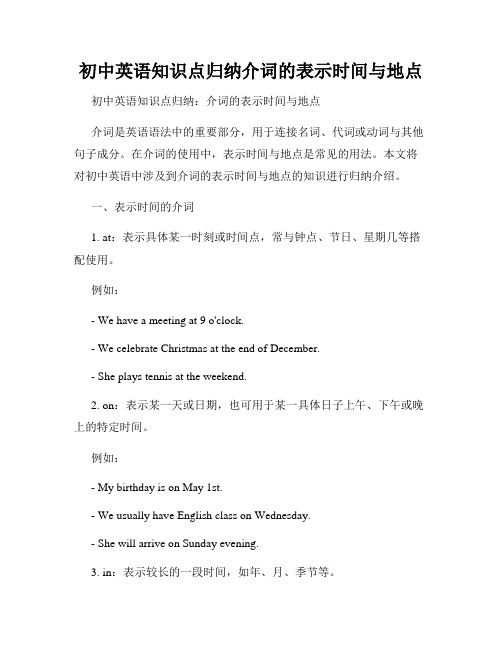
初中英语知识点归纳介词的表示时间与地点初中英语知识点归纳:介词的表示时间与地点介词是英语语法中的重要部分,用于连接名词、代词或动词与其他句子成分。
在介词的使用中,表示时间与地点是常见的用法。
本文将对初中英语中涉及到介词的表示时间与地点的知识进行归纳介绍。
一、表示时间的介词1. at:表示具体某一时刻或时间点,常与钟点、节日、星期几等搭配使用。
例如:- We have a meeting at 9 o'clock.- We celebrate Christmas at the end of December.- She plays tennis at the weekend.2. on:表示某一天或日期,也可用于某一具体日子上午、下午或晚上的特定时间。
例如:- My birthday is on May 1st.- We usually have English class on Wednesday.- She will arrive on Sunday evening.3. in:表示较长的一段时间,如年、月、季节等。
例如:- I was born in 2005.- He will go to Canada in the summer.- They always go skiing in January.4. during:表示在某一段时间内。
例如:- I read a book during the summer vacation.- They have a party during the New Year's holiday.5. for:表示持续的一段时间。
例如:- I have been learning English for five years.- They will stay in the hotel for a week.二、表示地点的介词1. in:表示在一个较大的范围或区域内。
时间地点介词的具体用法

Word 文档1 / 1 时间地点介词的具体用法时间地点介词的具体用法具体日期前用"on'留意:一、含有this, that,these, those, every, each 等的时间状语前不用介词。
如: We are going to play football this afternoon. 今日下午我们预备踢足球。
His father goes to work early every day. 他爸爸每天很早去上班。
They are working on the farm at the moment. 这几天他们正在农场干活。
二、 all day, all week, allyear 等由"all +表示时间的名词'构成的时间状语前不用介词。
如:We stay at home and watch TV all day.我们成天呆在家里看电视。
三、由"some, any,one 等+表示时间的名词'构成的时间状语前不用介词。
如: We can go to the Great Wall some day. 有一天我们会去长城的。
四、时间状语是today, tomorrow, tomorrowmorning, tomorrow afternoon, tomorrow evening, the day after tomorrow (后天)等,其前不用介词。
如: What day is it today?今日星期几?Whos on duty tomorrow? 明天谁值日?MORE:at 表示时间的某一点(节日或年龄、瞬间或短暂的时间)Your memory is always poor at this time.(表示一天中的某个时刻不用冠词)I got up at six in the mopning. on 表示某日或和某日连用的某个时间段 You were late on Monday last week. in 用于表示除日以外的某一时间段 (表示年、月、季节、世纪时代) Sorry, I am late, the frist time in May. in 和at 都可表示地点,而in 表示的地点比at 所表示的地点大。
介词的用法和位置
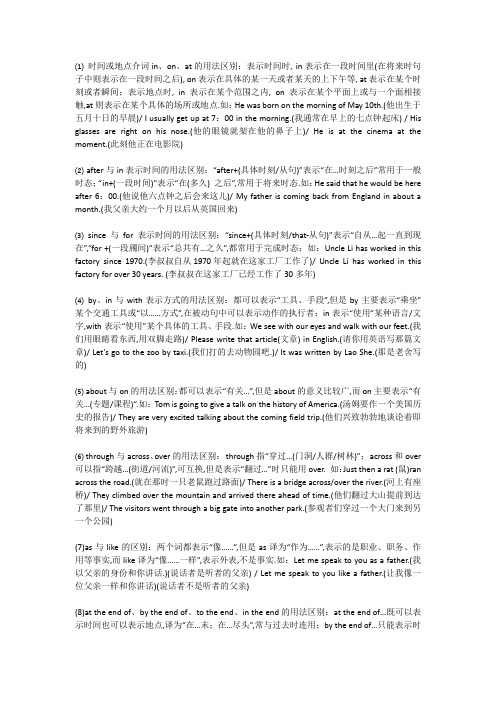
⑴时间或地点介词in、on、at的用法区别:表示时间时, in表示在一段时间里(在将来时句子中则表示在一段时间之后), on表示在具体的某一天或者某天的上下午等, at表示在某个时刻或者瞬间;表示地点时, in表示在某个范围之内, on表示在某个平面上或与一个面相接触,at则表示在某个具体的场所或地点.如:He was born on the morning of May 10th.(他出生于五月十日的早晨)/ I usually get up at 7:00 in the morning.(我通常在早上的七点钟起床) / His glasses are right on his nose.(他的眼镜就架在他的鼻子上)/ He is at the cinema at the moment.(此刻他正在电影院)⑵ after与in表示时间的用法区别:“after+(具体时刻/从句)”表示“在…时刻之后”常用于一般时态;“in+(一段时间)”表示“在(多久) 之后”,常用于将来时态.如:He said that he would be here after 6:00.(他说他六点钟之后会来这儿)/ My father is coming back from England in about a month.(我父亲大约一个月以后从英国回来)⑶since与for表示时间的用法区别:“since+(具体时刻/that-从句)”表示“自从…起一直到现在”,“for +(一段斶间)”表示“总共有…之久”,都常用于完成时态;如:Uncle Li has worked in this factory since 1970.(李叔叔自从1970年起就在这家工厂工作了)/ Uncle Li has worked in this factory for over 30 years. (李叔叔在这家工厂已经工作了30多年)⑷by、in与with表示方式的用法区别:都可以表示“工具、手段”,但是by主要表示“乘坐”某个交通工具或“以……方式”,在被动句中可以表示动作的执行者;in表示“使用”某种语言/文字,with表示“使用”某个具体的工具、手段.如:We see with our eyes and walk with our feet.(我们用眼睛看东西,用双脚走路)/ Please write that article(文章) in English.(请你用英语写那篇文章)/ Let’s go to the zoo by taxi.(我们打的去动物园吧.)/ It was written by Lao She.(那是老舍写的)⑸ about与on的用法区别:都可以表示“有关…”,但是about的意义比较广,而on主要表示“有关…(专题/课程)”.如:Tom is going to give a talk on the history of America.(汤姆要作一个美国历史的报告)/ They are very excited talking about the coming field trip.(他们兴致勃勃地谈论着即将来到的野外旅游)⑹ through与across、over的用法区别:through指“穿过…(门洞/人群/树林)”;across和over 可以指“跨越…(街道/河流)”,可互换,但是表示“翻过…”时只能用over. 如:Just then a rat (鼠)ran across the road.(就在那时一只老鼠跑过路面)/ There is a bridge across/over the river.(河上有座桥)/ They climbed over the mountain and arrived there ahead of time.(他们翻过大山提前到达了那里)/ The visitors went through a big gate into another park.(参观者们穿过一个大门来到另一个公园)(7)as与like的区别:两个词都表示“像……”,但是as译为“作为……”,表示的是职业、职务、作用等事实,而like译为“像……一样”,表示外表,不是事实.如:Let me speak to you as a father.(我以父亲的身份和你讲话.)(说话者是听者的父亲) / Let me speak to you like a father.(让我像一位父亲一样和你讲话)(说话者不是听者的父亲)(8)at the end of、by the end of、to the end、in the end的用法区别:at the end of…既可以表示时间也可以表示地点,译为“在…末;在…尽头”,常与过去时连用;by the end of…只能表示时间,译为“在…前;到…为止”,常用于过去完成时;in the end与at last基本等义,表示“终于、最后”,通常用于过去时;to the end译为“到…的终点为止”,前面往往有表示运动或连续性的动词.如:By the end of last term we had learned 16 units of Book III.(到上学期期末我们已经学习了第三册16个单元)/ At the end of the road you can find a big white house with brown windows.(在路的尽头你能找到一幢有棕色窗户的白房子)/ They left for Beijing at the end of last week.(上周末他们动身去了北京)/ In the end he succeeded in the final exams.(他最终在期末考试中考及格了)/ We should go on with the work to the end.(我们应该把工作干到底)/ Follow this road to the end and you will see a post office.(沿这条路走到底就能看见一家邮电局)(9)for a moment、for the moment、in a moment、at the moment的区别:for a moment“一会儿、片刻”(=for a while),常与持续性动词连用;for the moment“暂时、目前”,常用于现在时;in a moment“一会儿、立即、马上”(=soon; in a few minutes),一般用于将来时;at the moment“此刻,眼下”(=now),用于现在进行时.如:Please wait for a moment.(请稍等)/ Let’s leave things as they are for the moment.(暂时就维持现状吧!) / I’ll come back in a moment.(我过会儿回来)/ I am very busy at the moment.(眼下我很忙)(10)but的问题:用介词but引出另一个动词时,要注意:如果前面有do,后面就用原形动词,前面没有do时,后面的动词要加to.如:I could do nothing but wait.(我什么也做不了只能等) / They had no choice(选择) but to fight.(他们没有选择只有战斗)。
介词的使用方法口诀
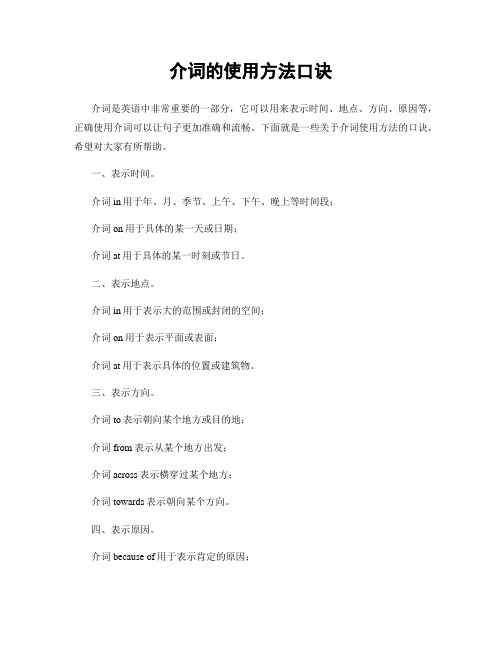
介词的使用方法口诀介词是英语中非常重要的一部分,它可以用来表示时间、地点、方向、原因等,正确使用介词可以让句子更加准确和流畅。
下面就是一些关于介词使用方法的口诀,希望对大家有所帮助。
一、表示时间。
介词in用于年、月、季节、上午、下午、晚上等时间段;介词on用于具体的某一天或日期;介词at用于具体的某一时刻或节日。
二、表示地点。
介词in用于表示大的范围或封闭的空间;介词on用于表示平面或表面;介词at用于表示具体的位置或建筑物。
三、表示方向。
介词to表示朝向某个地方或目的地;介词from表示从某个地方出发;介词across表示横穿过某个地方;介词towards表示朝向某个方向。
四、表示原因。
介词because of用于表示肯定的原因;介词due to用于表示中性的原因;介词owing to用于表示正式的原因;介词thanks to用于表示积极的原因。
五、其他常用介词。
介词by表示通过某种方式或工具;介词with表示伴随或使用某物;介词for表示为了某种目的或代表某人。
六、特殊用法。
介词in、on、at在特定搭配中有特殊用法,需要根据具体情况进行记忆和理解。
七、总结。
介词的使用方法口诀并非一成不变,需要根据具体语境进行灵活运用。
通过大量的阅读和实践,逐渐掌握介词的用法是非常重要的。
以上就是介词的使用方法口诀,希望对大家有所帮助。
在学习英语的过程中,多多积累、多多练习,相信大家一定能够掌握好介词的使用方法,写出更加地道和流畅的英语句子。
介词十时间十地点的用法

介词十时间十地点的用法一、介词简介介词是英语中用于表示时间或地点的词,常见的有at、in、on 等。
它们在句子中起到连接作用,将名词、代词等与句子中的其他部分连接起来。
二、时间介词用法1. at表示时间的一点,用于表示具体时刻,如at 7 o'clock。
2. in表示在某个时间段内或某个较长的时间段内,如in the morning、in a week。
3. on表示特定的某一天或某一天的某个时间,如on Monday、on Saturday afternoon。
三、地点介词用法1. at表示具体地点或场所,如at the bus stop。
2. in表示在某个空间内或某个范围中,如in the classroom。
3. on表示在某个表面上或与某个表面接触的物体上,如on the desk。
四、时间地点组合用法时间与地点的用法通常是用于表达某件事情发生的具体时间和地点。
以下是几种常见的用法:1. 在某年某月某日(某年/月/日)在某地,例如:I met him in New York City on July 4th, 2023. (我在2023年7月4日在新泽西州纽约市遇到了他。
)2. 在某年某月某日几点钟在某地,例如:He arrived at 9o'clock in the morning in Beijing. (他上午9点钟到达北京。
)3. 在某段时间内某地发生某事,例如:The accident happened on the road between London and Edinburgh a few years ago.(几年前,事故发生在伦敦和爱丁堡之间的路上。
)4. 在某个季节或时段在某地,例如:I often go for a walk in the park in spring. (我经常在春天去公园散步。
)需要注意的是,在使用介词表达时间和地点时,要遵循语法规则和语境,避免使用不当的介词导致表达错误。
初中英语知识点归纳介词的地点介词和时间介词的用法
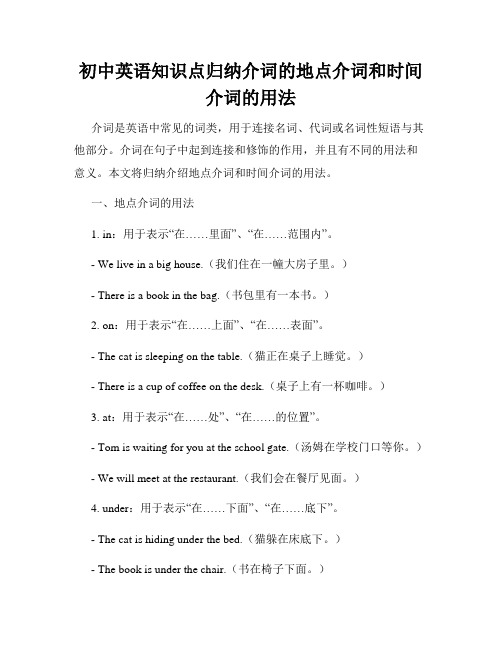
初中英语知识点归纳介词的地点介词和时间介词的用法介词是英语中常见的词类,用于连接名词、代词或名词性短语与其他部分。
介词在句子中起到连接和修饰的作用,并且有不同的用法和意义。
本文将归纳介绍地点介词和时间介词的用法。
一、地点介词的用法1. in:用于表示“在……里面”、“在……范围内”。
- We live in a big house.(我们住在一幢大房子里。
)- There is a book in the bag.(书包里有一本书。
)2. on:用于表示“在……上面”、“在……表面”。
- The cat is sleeping on the table.(猫正在桌子上睡觉。
)- There is a cup of coffee on the desk.(桌子上有一杯咖啡。
)3. at:用于表示“在……处”、“在……的位置”。
- Tom is waiting for you at the school gate.(汤姆在学校门口等你。
)- We will meet at the restaurant.(我们会在餐厅见面。
)4. under:用于表示“在……下面”、“在……底下”。
- The cat is hiding under the bed.(猫躲在床底下。
)- The book is under the chair.(书在椅子下面。
)5. next to:用于表示“紧靠着……旁边”。
- My house is next to a park.(我的房子紧靠着一个公园。
)- The supermarket is next to the bank.(超市在银行旁边。
)6. between:用于表示“在……之间”、“位于两者之间”。
- The library is between the school and the hospital.(图书馆位于学校和医院之间。
)- The restaurant is between the bookstore and the cinema.(餐厅在书店和电影院之间。
介词用法总结地点时间方向
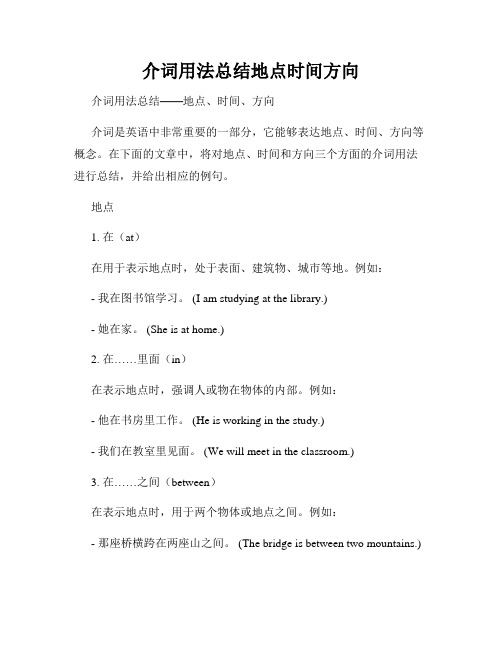
介词用法总结地点时间方向介词用法总结——地点、时间、方向介词是英语中非常重要的一部分,它能够表达地点、时间、方向等概念。
在下面的文章中,将对地点、时间和方向三个方面的介词用法进行总结,并给出相应的例句。
地点1. 在(at)在用于表示地点时,处于表面、建筑物、城市等地。
例如:- 我在图书馆学习。
(I am studying at the library.)- 她在家。
(She is at home.)2. 在……里面(in)在表示地点时,强调人或物在物体的内部。
例如:- 他在书房里工作。
(He is working in the study.)- 我们在教室里见面。
(We will meet in the classroom.)3. 在……之间(between)在表示地点时,用于两个物体或地点之间。
例如:- 那座桥横跨在两座山之间。
(The bridge is between two mountains.)- 我的家和学校之间有一条小路。
(There is a path between my house and school.)4. 在……附近(near)表示地点时,表示某物或某人靠近某个地点。
例如:- 邮局就在这附近。
(The post office is near here.)- 我家附近有一家超市。
(There is a supermarket near my house.)时间1. 在……之前(before)在表示时间时,表示某一事件发生前的时间点。
例如:- 学生们在考试之前要复习。
(Students need to review before the exam.)- 我们在见面之前先吃饭。
(Let's have dinner before we meet.)2. 在……期间(during)在表示时间时,表示某一事件发生的整个期间。
例如:- 我们在假期期间去了海滩。
at、in、on在时间地点上的用法
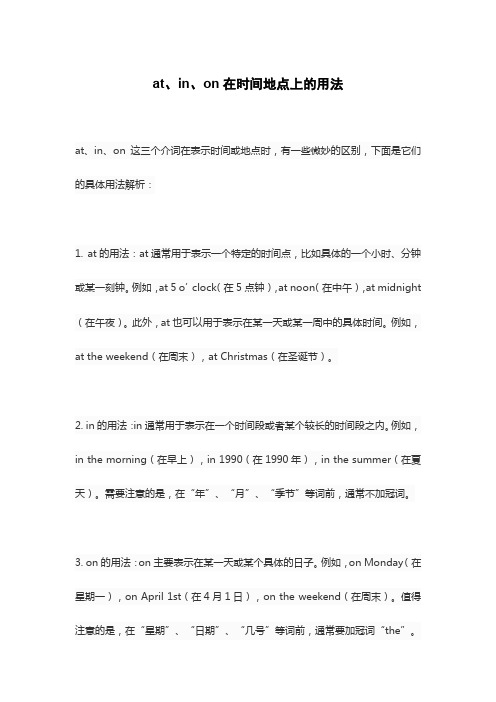
at、in、on在时间地点上的用法at、in、on这三个介词在表示时间或地点时,有一些微妙的区别,下面是它们的具体用法解析:1. at的用法:at通常用于表示一个特定的时间点,比如具体的一个小时、分钟或某一刻钟。
例如,at 5 o’clock(在5点钟),at noon(在中午),at midnight (在午夜)。
此外,at也可以用于表示在某一天或某一周中的具体时间。
例如,at the weekend(在周末),at Christmas(在圣诞节)。
2. in的用法:in通常用于表示在一个时间段或者某个较长的时间段之内。
例如,in the morning(在早上),in 1990(在1990年),in the summer(在夏天)。
需要注意的是,在“年”、“月”、“季节”等词前,通常不加冠词。
3. on的用法:on主要表示在某一天或某个具体的日子。
例如,on Monday(在星期一),on April 1st(在4月1日),on the weekend(在周末)。
值得注意的是,在“星期”、“日期”、“几号”等词前,通常要加冠词“the”。
关于地点方面,这三个介词的区别主要如下:1. at表示在某一点,或者在小的、具体的范围内。
例如,at the bus stop(在公交车站),at the crossroads(在十字路口)。
2. in表示在一个较大的、封闭的空间或者范围之内。
例如,in the classroom (在教室里),in the office building(在办公楼里)。
3. on表示在某个物体的表面或者上方。
例如,on the table(在桌子上),on the floor(在地上)。
以上是at、in、on三个介词的基本用法解析,它们的具体用法可能会因语境的不同而有所变化。
在使用时,要根据具体的语境选择合适的介词。
全面、清晰的in、on、at的时间用法和地点用法
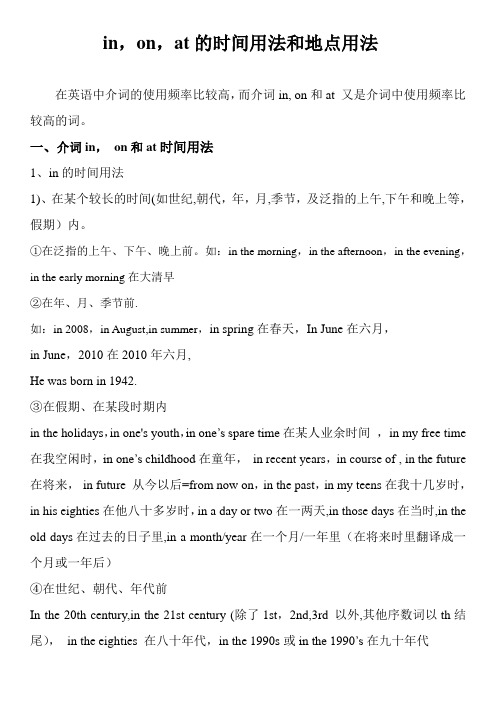
in,on,at的时间用法和地点用法在英语中介词的使用频率比较高,而介词in, on和at 又是介词中使用频率比较高的词。
一、介词in,on和at时间用法1、in的时间用法1)、在某个较长的时间(如世纪,朝代,年,月,季节,及泛指的上午,下午和晚上等,假期)内。
①在泛指的上午、下午、晚上前。
如:in the morning,in the afternoon,in the evening,in the early morning在大清早②在年、月、季节前.如:in 2008,in August,in summer,in spring在春天,In June在六月,in June,2010在2010年六月,He was born in 1942.③在假期、在某段时期内in the holidays,in one's youth,in one’s spare time在某人业余时间,in my free time 在我空闲时,in one’s childhood在童年,in recent years,in course of , in the future 在将来,in future 从今以后=from now on,in the past,in my teens在我十几岁时,in his eighties在他八十多岁时,in a day or two在一两天,in those days在当时,in the old days在过去的日子里,in a month/year在一个月/一年里(在将来时里翻译成一个月或一年后)④在世纪、朝代、年代前In the 20th century,in the 21st century (除了1st,2nd,3rd 以外,其他序数词以th结尾),in the eighties 在八十年代,in the 1990s或in the 1990’s在九十年代2)、在一段时间in a month/year在一个月/年里(在将来时里翻译成一个月/年之后)in the day(time)在白天,可换成duringin my childhood在我的童年里in my free/leisure time在我空闲时,in可换成during,也可以写成at leisure在空闲时.He will come round in a day or two。
介词的基本用法及常见句型总结

介词的基本用法及常见句型总结介词是英语中非常重要的一类词性,用来表示名词或代词与其他句子成分之间的关系。
在句子中,介词通常用于表示时间、地点、方向、原因、目的、手段等概念。
本文将总结介词的基本用法,并提供常见的句型示例。
一、表示时间1.介词"in"表示在某一特定时刻:- I will meet you in the morning.2.介词"on"表示在某一天、日期或特定的节日:- We will have a party on Christmas.3.介词"at"表示在某一具体时间(钟点):- The meeting will start at 9 o'clock.4.介词"by"表示在某一截止时间之前:- Please finish the report by Friday.5.介词"during"表示在某一时间段内:- I studied English during my summer vacation.6.介词"for"表示在一段时间内:- They have been friends for ten years.二、表示地点1.介词"in"表示在某一地点内:- She is waiting for you in the library.2.介词"on"表示在某一表面或平面上:- The book is on the table.3.介词"at"表示在某一具体地点:- Let's meet at the park tomorrow.4.介词"by"表示经过某一地点或靠近某一地点: - The bus will pass by the shopping mall.5.介词"to"表示朝向某一地点:- I am going to school.三、表示方向1.介词"from"表示从某一地点出发:- He came from the airport.2.介词"to"表示朝向某一地点:- She is walking to the supermarket.3.介词"into"表示进入某一地点:- The cat jumped into the box.4.介词"out of"表示从某一地点出来:- The children ran out of the classroom.四、表示原因1.介词"because of"表示因为某个原因:- He couldn't come to the meeting because of the traffic.2.介词"due to"表示由于某个原因:- The flight was delayed due to bad weather.3.介词"for"表示出于某种考虑或原因:- She chose the career path for personal development.五、表示目的1.介词"for"表示为了某种目的:- They went to the store for groceries.2.介词"to"表示到达某个目的地:- I am going to the park to meet my friends.六、表示手段1.介词"with"表示使用某种工具、手段:- I cut the cake with a knife.2.介词"by"表示通过某种手段实现:- She learned Chinese by watching Chinese movies.七、其他常见用法1.介词"of"用于表达分属关系、所属关系:- The cover of the book is torn.2.介词"about"用于表达关于某个主题的内容:- I know a lot about history.3.介词"with"用于表达伴随关系或某种属性:- She is a girl with curly hair.4.介词"by"用于表达被动方式或原因:- The book was written by a famous author.总结:介词的用法多种多样,常见的有表示时间、地点、方向、原因、目的、手段等。
介词的用法及常见搭配表示时间地点方向等
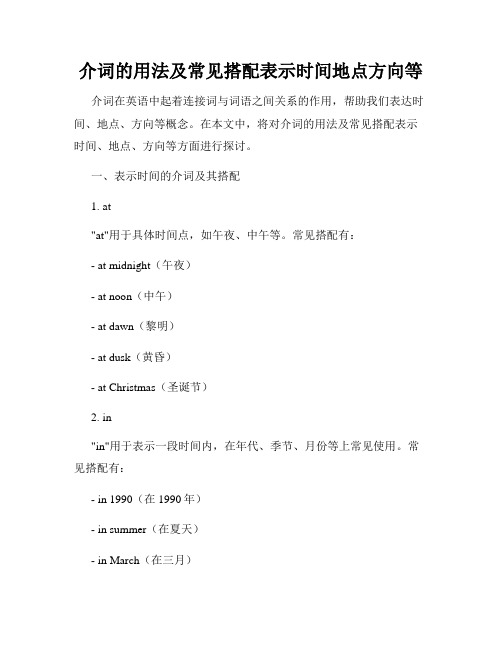
介词的用法及常见搭配表示时间地点方向等介词在英语中起着连接词与词语之间关系的作用,帮助我们表达时间、地点、方向等概念。
在本文中,将对介词的用法及常见搭配表示时间、地点、方向等方面进行探讨。
一、表示时间的介词及其搭配1. at"at"用于具体时间点,如午夜、中午等。
常见搭配有:- at midnight(午夜)- at noon(中午)- at dawn(黎明)- at dusk(黄昏)- at Christmas(圣诞节)2. in"in"用于表示一段时间内,在年代、季节、月份等上常见使用。
常见搭配有:- in 1990(在1990年)- in summer(在夏天)- in March(在三月)- in the morning(在上午)- in the evening(在晚上)3. on"on"用于具体的日期或特定的时间,如星期几,节日等。
常见搭配有:- on January 1st(在1月1日)- on Monday(在星期一)- on Christmas Day(在圣诞节)- on New Year's Eve(在除夕)4. since"since"用于表示从某个具体时间开始一直持续到现在。
常见搭配有:- since 2010(自2010年以来)- since yesterday(从昨天起)- since I was a child(自从我是个孩子)5. for"for"用于表示一段时间的持续。
常见搭配有:- for two hours(两个小时)- for three days(三天)- for a week(一周)- for a long time(很长时间)二、表示地点的介词及其搭配1. in"in"用于表示大的地区或城市,国家。
常见搭配有:- in China(在中国)- in New York(在纽约)- in the park(在公园)- in the library(在图书馆)2. at"at"用于表示具体的地点或建筑物。
(详细版)介词的用法总结
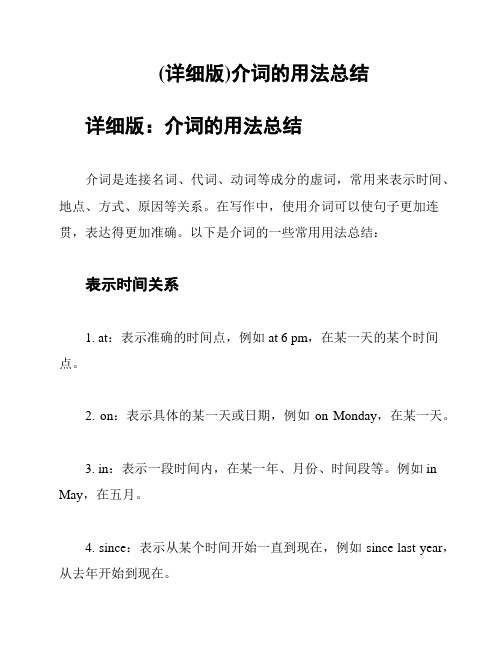
(详细版)介词的用法总结详细版:介词的用法总结介词是连接名词、代词、动词等成分的虚词,常用来表示时间、地点、方式、原因等关系。
在写作中,使用介词可以使句子更加连贯,表达得更加准确。
以下是介词的一些常用用法总结:表示时间关系1. at:表示准确的时间点,例如 at 6 pm,在某一天的某个时间点。
2. on:表示具体的某一天或日期,例如on Monday,在某一天。
3. in:表示一段时间内,在某一年、月份、时间段等。
例如 in May,在五月。
4. since:表示从某个时间开始一直到现在,例如 since last year,从去年开始到现在。
5. for:表示持续的时间,在某段时间内。
例如 for two hours,持续两个小时。
表示地点关系1. at:表示在某个位置。
例如 at home,在家。
2. on:表示在一个平面面上。
例如 on the table,在桌子上。
3. in:表示在一个封闭的空间内。
例如in the room,在房间里。
4. to:表示到某个地方。
例如 go to school,去学校。
表示方式、原因、目的等关系1. by:表示通过某种方式。
例如 by plane,乘飞机。
2. with:表示用某种工具或伴随某人物。
例如 write with pen,用笔写。
3. for:表示为了某种目的。
例如 for health,为了健康。
4. because of:表示因为某种原因。
例如 because of the rain,因为下雨。
以上只是介词用法的一部分,需要灵活运用,不要生搬硬套,以免出现错误。
希望以上总结对您有所帮助。
介词十时间十地点的用法

介词十时间十地点的用法介词在语法中是起连接作用的一类词语,它常常用于表示时间和地点。
介词的正确使用对于构成句子和表达意思至关重要。
本文将详细介绍介词在时间和地点上的用法,并举例说明。
一、时间介词的用法1. 在介词“在”表示某一时间点或某一特定时间范围内发生的事件。
如:在早晨、在下午、在昨天等。
例句:我们在早晨出发去郊外野餐。
2. 在……期间介词“在……期间”表示某一时间段内进行或发生的活动。
例句:在假期期间,我计划去旅行。
3. 自从介词“自从”表示开始时间,表示某一特定的时间点以后,一直延续到现在。
例句:自从我换了工作,生活变得更加忙碌了。
4. 到介词“到”表示时间的终点或截止时间。
例句:开会的时间安排到下午四点结束。
5. 经过介词“经过”表示经过某一段时间或经过某个时间点。
例句:经过一番思考,他做出了重要决定。
6. 在……之前介词“在……之前”表示在某一时间点之前。
例句:在开学之前,我打算去旅行。
7. 从……到……介词“从……到……”表示开始时间到结束时间。
例句:我的学校时间是从早上八点到下午四点。
二、地点介词的用法1. 在介词“在”表示一个具体的地点或在一个范围内。
例句:我家在北京市。
2. 在……对面介词“在……对面”表示在某一地点的对面。
例句:医院在学校的对面。
3. 在……里面介词“在……里面”表示在某一地点的内部。
例句:钥匙在抽屉里面。
4. 过介词“过”表示通过某个地点。
例句:我们要从桥上过河。
5. 在……旁边介词“在……旁边”表示在某个地点的旁边。
例句:商店在学校的旁边。
6. 在……中间介词“在……中间”表示在某个地点的中间。
例句:小河在村庄的中间流过。
以上介绍了关于介词在时间和地点上的用法,通过这些例句可以更好地理解介词在句子中的具体运用。
正确使用介词能够使句子更加清晰地表达时间和地点,避免歧义,使交流更加顺畅。
希望这份介绍对大家有所帮助,能够加深对介词用法的理解。
常见介词的用法
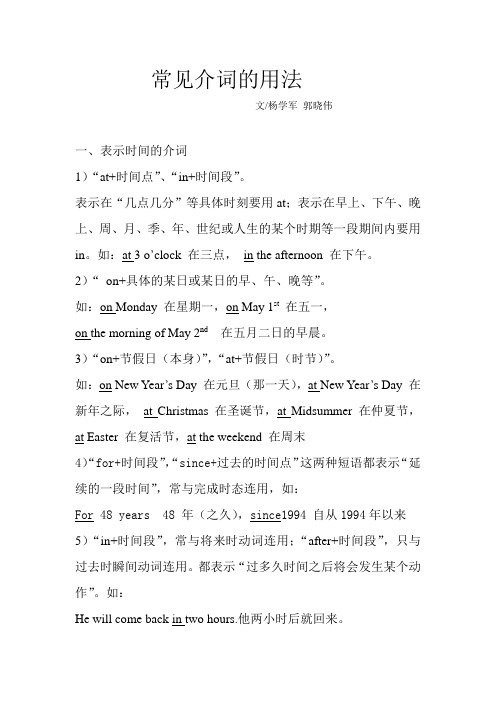
常见介词的用法文/杨学军郭晓伟一、表示时间的介词1)“at+时间点”、“in+时间段”。
表示在“几点几分”等具体时刻要用at;表示在早上、下午、晚上、周、月、季、年、世纪或人生的某个时期等一段期间内要用in。
如:at 3 o’clock 在三点,in the afternoon 在下午。
2)“on+具体的某日或某日的早、午、晚等”。
如:on Monday 在星期一,on May 1st在五一,on the morning of May 2nd在五月二日的早晨。
3)“on+节假日(本身)”,“at+节假日(时节)”。
如:on New Year’s Day 在元旦(那一天),at New Year’s Day 在新年之际,at Christmas 在圣诞节,at Midsummer 在仲夏节,at Easter 在复活节,at the weekend 在周末4)“for+时间段”,“since+过去的时间点”这两种短语都表示“延续的一段时间”,常与完成时态连用,如:For 48 years 48 年(之久),since1994 自从1994年以来5)“in+时间段”,常与将来时动词连用;“after+时间段”,只与过去时瞬间动词连用。
都表示“过多久时间之后将会发生某个动作”。
如:He will come back in two hours.他两小时后就回来。
He came back after two hours.俩个小时后回来了。
二、表示地点、范围、趋向的介词。
1)“at+点”,“on+面”,“in+体”。
如:He stood at the door with a picture on it,looking in through a hole in the door.一个陌生人站在上面贴有一张画的门那儿,正从门上的孔洞里向里观望。
2)“across+表面”,“through+空间”。
如:The river runs through our city,across the firlds and then into the sea.那条河穿过我们城市,流经田野,然后汇入大海。
介词十时间十地点的用法

介词十时间十地点的用法介词是连接词和名词、代词或动词之间的词汇,用来表示名词或代词与其他成分之间的关系。
介词在句子中扮演着非常重要的角色,它可以表示时间、地点、原因、方式等不同的关系。
在英语中,介词的使用非常灵活多样,而且也是学习者容易混淆和误用的部分之一。
本文将主要探讨介词在表示时间和地点方面的用法。
一、表示时间的介词用法1. in"in"表示在某一段时间范围内,在年、月、季节、早上、下午等时间单位前使用。
例如:in the morning(在早晨)、in summer(在夏天)、in 2019(在2019年)。
2. on"on"表示在某一具体的日期或某一天的早晨、下午、晚上等时间点。
例如:on Monday (在星期一)、on July 4th(在7月4日)。
3. at"at"表示在某一具体的时间点,通常用于某一天的具体时间和时刻。
例如:at 3o'clock(在3点钟)、at noon(在中午)。
4. for"for"表示持续的时间段,通常用来表示一段时间的长短。
例如:for two hours(两个小时)。
5. during"during"表示在某一段时间内,通常和动词的进行时态一起使用。
例如:during the meeting(在会议期间)、during the summer(在夏天期间)。
6. since"since"表示从某一时间点开始一直延续到现在,常与完成时或延续性动词连用。
例如:since 2010(从2010年开始)、since I was a child(从我还是小孩的时候)。
二、表示地点的介词用法1. in"in"表示在某一范围内的地点。
例如:in China(在中国)、in the kitchen(在厨房)。
2. on"on"表示在某一表面上的地点,通常用在某个平面或者表面上。
- 1、下载文档前请自行甄别文档内容的完整性,平台不提供额外的编辑、内容补充、找答案等附加服务。
- 2、"仅部分预览"的文档,不可在线预览部分如存在完整性等问题,可反馈申请退款(可完整预览的文档不适用该条件!)。
- 3、如文档侵犯您的权益,请联系客服反馈,我们会尽快为您处理(人工客服工作时间:9:00-18:30)。
具体日期前用“on”
注意:
一、含有this, that, these, those, every, each 等的时间状语前不用介词。
如:
We are going to play football this afternoon. 今天下午我们打算踢足球。
His father goes to work early every day. 他爸爸每天很早去上班。
They are working on the farm at the moment. 这几天他们正在农场干活。
二、all day, all week, all year 等由“all +表示时间的名词”构成的时间状语前不用介词。
如:
We stay at home and watch TV all day.我们整天呆在家里看电视。
三、由“some, any, one等+表示时间的名词”构成的时间状语前不用介词。
如:
We can go to the Great Wall some day. 有一天我们会去长城的。
四、时间状语是today, tomorrow, tomorrow morning, tomorrow afternoon, tomorrow evening, the day after tomorrow (后天)等,其前不用介词。
如:
What day is it today?今天星期几?
Who's on duty tomorrow? 明天谁值日?
MORE:
at 表示时间的某一点
(节日或年龄、瞬间或短暂的时间)
Your memory is always poor at this time.
(表示一天中的某个时刻不用冠词)
I got up at six in the mopning.
on 表示某日或和某日连用的某个时间段
You were late on Monday last week.
in 用于表示除日以外的某一时间段
(表示年、月、季节、世纪时代)
Sorry, I am late, the frist time in May.
in和at都可表示地点,而in表示的地点比at所表示的地点大。
